A true adventure, The Camel Trophy - #blogpost
The Camel Trophy was a vehicle-oriented competition that was held annually between 1980 and 2000, and it was best known for its use of Land Rover vehicles over extremely challenging terrain through lots of different countries.
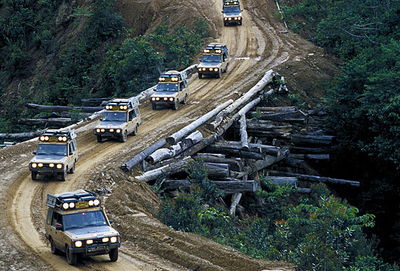
The Camel Trophy was a vehicle-oriented competition that was held annually between 1980 and 2000, and it was best known for its use of Land Rover vehicles over extremely challenging terrain through lots of different countries.
The first year the camel trophy was offered it was Jeep CJ5’s that would take up the challenge travelling through the Trans-Amazonian Highway it was a journey of 1500 miles and hardly any of them would be on roads. So the 16 teams of all different nations set off, not knowing what to expect from this challenge, unfortunately however none out of the 16 teams would finish the gruelling off road event. So after this failed attempt the organisers turned to Land Rover for help and they responded with sure we’ll take up your challenge and so the camel trophy was born.
The 1980's
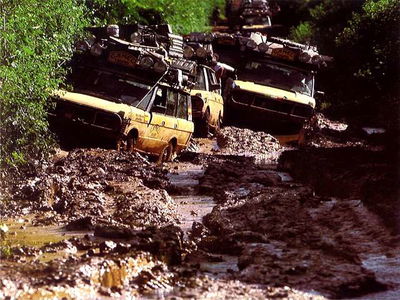
The second Camel Trophy began in 1981 with the vehicles travelling through Sumatra, this would be the first test of the Land Rovers capability’s as an off road vehicle. Only five teams set out this time, consisting of eight men and two women, set out to tackle another ferocious expedition route through the forests of the Far East. The route selected, on the Indonesian island of Sumatra, required the teams to drive 1,600 km across the equator from Medan in the north to Jambi in the south. The organisers had learned well from the 1980 event and this time round selected Range Rover as being the only vehicle considered reliable and robust enough to withstand the unimaginable punishment inflicted on cars in the equatorial jungles, however the teams would have to face everything along the way from volcanoes and mountain ranges to swamps which could swallow a car whole in certain places. Despite the elements, all five teams finally made it through to the finish, and that would put the camel trophy on the map for good,
The first international Camel Trophy 1983
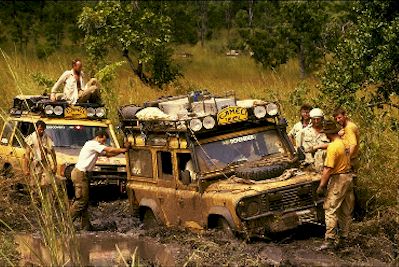
Starting the 1983 trophy there would be two teams from each nation including ones from Hong Kong, USA, Portugal, Holland, Germany and Italy as well as a brand new land rover making its debut, the Series 3 88” Land Rover. This time the camel trophy was held in Africa and conditions for the first African Camel Trophy on the 1,600 km drive from Kinshasa north east to Kisangani were extremely diverse, with terrain varying from deep mud to desert sand. However, the conditions on the ground paled in comparison with the searing temperatures that topped 48’C with a suffocating 95 % humidity. but yet again every single car with every team member making it through the Finnish line, with victory going to the Italians.
The modifications
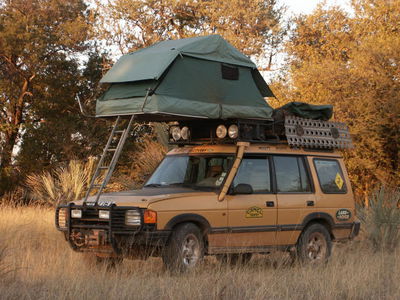
1985 marked the five year anniversary for camel trophy and Land Rover decided to step there game up after Africa’s heat from the last event was extremely difficult on the people, they added additional modifications to the already proven land rover defenders. The new cars got
-Safety Devices roll cages
-Under body protection and steering guards
-Modified electrical systems
-Winches
-Dixon Bate tow hitches and recovery points
-Mantec snorkels
-Transmission breathers
-Michelin XCL or BF Goodrich Mud Terrain tyres
-Upgraded suspension and transmission components
-Auxiliary fuel tanks
-webasto fuel burning heaters
-Brownchurch / Safety Devices roof racks
-Hella driving, spot, fog, convoy and work lamps
-Brownchurch Bull bars and bush wires
-Flag poles
1985 The hardest event yet
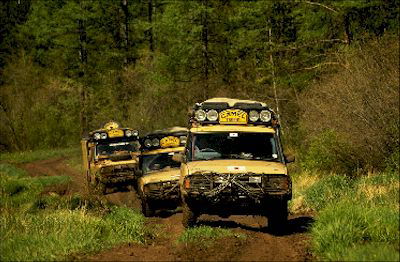
For the 1985 event people from all around the globe came to join in on this years camel trophy, not knowing what they were in for To mark its fifth anniversary in 1985, Camel Trophy returned to Brazil, to the depths of the largest rain forest in the world, the Amazon Basin. Again Land Rover was the choice of the organisers with the brand new Defender 110. The route selected again involved the notorious Transamazonica Highway, but this time starting at Santarem, where the 1980 event ended, and finishing in Manaus, capital of Amazonas province. However A severe wet season in ’85 meant that the route originally selected proved impossible, so an alternative was found. However, the alternative but in fact that route would turn out to be worse, as they slogged and persevered through seemingly endless mud for 1500 miles in their Land Rover 110s. Three times the teams progress was interrupted by damaged or broken bridges, each with a gap more than twelve metres in length so they had two choices build a bridge or go home. After a great deal of effort and a lot of toil all twelve teams finally made it through to the finish on a bridge of sand laders and tree trunks.F or the second time in three years an Italian team, this time consisting of Maurizio Lavi and Alfredo Redaelli, won Camel Trophy.
Moving on to the 10th anniversary 1990
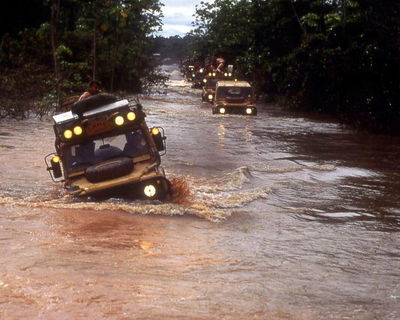
This was the toughest to date as 16 teams, 10th anniversary of an event that had by now more than earned its enviable international reputation had to be celebrated accordingly. So, in true Camel Trophy style it returned to its roots in 1990, once more making its way into the deep forest and unbelievable trails that are the Amazon jungle unfortunately this time there would be no roads at all because at this time the Amazon was experiencing its worst every rainy season, so everything was flooded. the locals who planned the route even ran a book giving frightening odds against the events success and how they would never make it anywhere near the finish line. so they set off and immediately saw why the locals were saying this. Day and night, the teams from 16 different countries tirelessly battled with the nightmarish muddy road. So nightmarish, in fact, that for several days the convoy barely managed to move more than 2 to 3 kilometres, one day in particular achieved the unbelievable record distance of 800 metres in a full 24 hour period. At the end of this 33 day memorable adventure, the Belgian team of Frank de Witte and Peter Denys were awarded the “Team Spirit Award, while the United Kingdom team, represented by brothers Bob and Joe Ives, won the ’89 Camel Trophy.
Moving on again to the 1994 trophy, the longest yet
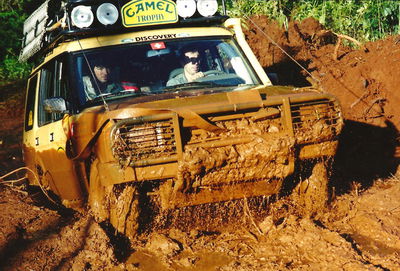
The 1994 trophy saw all 16 teams travel a huge distance of 2,500 miles over extremely difficult terrain also the route for the first time in Camel Trophy’s fifteen year history, crossed through three different countries. Starting in Argentina at the famous lguazu Falls in April 1994, Camel Trophy traversed Argentina, Paraguay and Argentina before crossing over the Andes into Chile. The teams also got a brand new 94 land rover discovery for the journey. The journey took the intrepid explorers down the principle river of Argentina (the Parana), through the steamy jungles and marshy Savannahs of Paraguay, back into the Argentinean Chaco, and up into the Andes to a height of 5,000 metres. Crossing into Chile across salt plains and the driest desert on earth. Throughout the three week event, there were numerous challenges confronting the participants, but none more awesome than the Andean Mountain Range. With temperatures on event varying from – 20’C in the Andes, to 40’C in the desert, and humidity from 100% in the tropical jungles to 0 % in the Andes, the climate and terrain were only two of the obstacles the teams had to cope with, in the end it would be a hard fought journey but a triumphant one at that, all teams made it and it would be the Spanish team that would take the victory in the end.
Then it all went downhill, camel trophy 1999
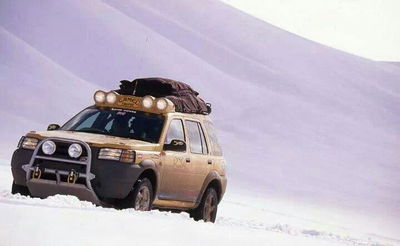
this time the organisers had the biggest turn out f any event with more than 500 people entering the event however this didn’t help the fact that this camel trophy would be awful. The Freelander proved popular and capable at the International Selections in Sweden. The driving exercises took place on mixed terrain, everything from mud, snow and gravel to the ice-covered Lake Djupsjon. With ice almost three feet thick, competitors had plenty of opportunity to play. however there was little in the way of off-road driving and the focus turned to special events like skiing, snowboarding and orienteering. So after this Land Rover decided that is would not take part in the camel trophy anymore as the organisers had taken the off road aspect out of the question and just left it to the other tasks, so land rover decided to pull the plug on the 18 year collaboration with camel and it was no more. However Land Rover did start a Camel Trophy’s successor: the “G4 Challenge in 2003 which is still going today.
thank you for reading this rather long blogpost about landrovers history in the camel trophy and if you would like to see more please do put it in the comments, also once again I’m new to the whole blogpost thing so this is not the best but its okay for now. I’m trying to improve it
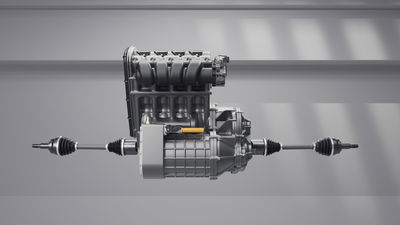












Comments
Stubaru(Subie Maniac)(Car Nerd) hummerinator (MUDD SQUAD) (Suzuki samurai & lada niva lover)
I love you a bit for this!!
JenstheGTIfreak (pizza)
Nicely written! Interesting that they didnt have relieability issues actually. They must have been much more different than the usual land rovers
Awesome blogpost!
Thanks man, I appreciate it
Nice! Never heard of this before - very interesting read!
Thank you man, I appreciate that
Kyle Ashdown
I heard when in indonesia they didn’t bring their cars back to UK but they sold their cars to some indonesian Land rover enthusiast
Possibly I know most of them went to museums but not sure on that one, it could be true
Very nice blog! I’d heard of the ‘Camel Trophy, but never investigated it. So it’s interesting to see the history behind it!
Thank you man, much appreciate. It is a very interesting thing I would have loved to do it actually lol
WHHHHOOOOOOOOO EDITORS PICK thank you Alex
Congrats!!!
Nice blog! Even if i haven’t heard about Camel Trophy before i like it!
Ayyy thanks man appreciate it, and yeah it is a very interesting thing I’d love to do it
EdwardPurkis look at this boy blogpost!
It’s super epic:)
Pagination